Supply Chain Ethics: A Case Study of KPR Mill in the Fashion Industry
VerifiedAdded on 2022/08/26
|7
|1874
|14
Case Study
AI Summary
This case study examines the ethical issues within KPR Mill's supply chain in the fashion industry. It highlights unethical behaviors, including poor treatment of the workforce, such as employing underage girls, providing low wages, and unsafe working conditions. The study also addresses environmental concerns stemming from the company's production practices. The case study explores the company's international supply chain, emphasizing the challenges of managing ethical standards across different countries and suppliers. Recommendations include enforcing ethical business practices, ensuring legal and moral responsibility, and promoting transparency. The study emphasizes the need for European companies to take responsibility for their subsidiaries' activities and for KPR Mill to adopt transparent policies. It concludes that unethical practices can lead to significant losses and threaten a company's interests, while ethical conduct ensures employee development and achievement of goals.
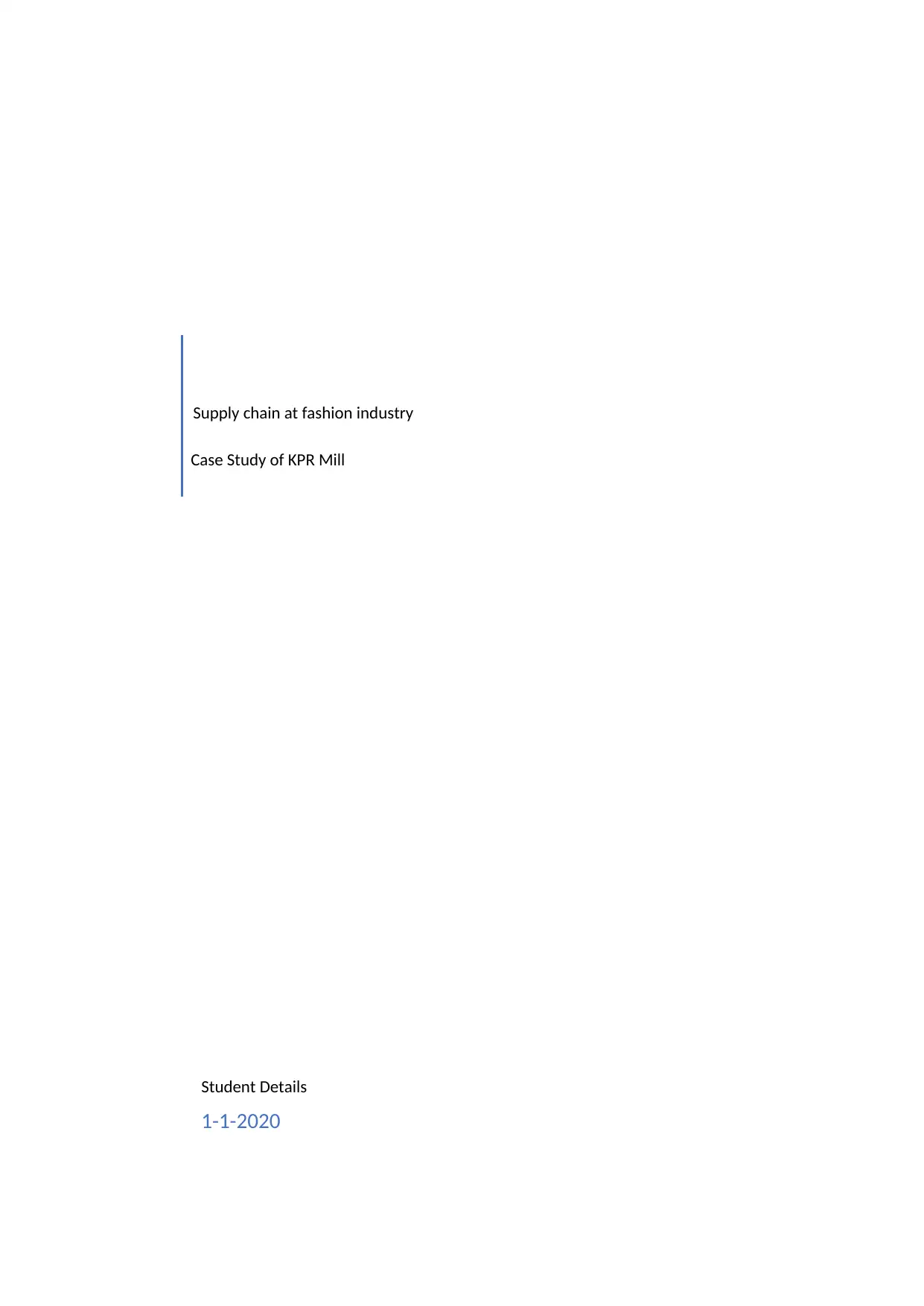
Supply chain at fashion industry
Case Study of KPR Mill
Student Details
1-1-2020
Case Study of KPR Mill
Student Details
1-1-2020
Paraphrase This Document
Need a fresh take? Get an instant paraphrase of this document with our AI Paraphraser
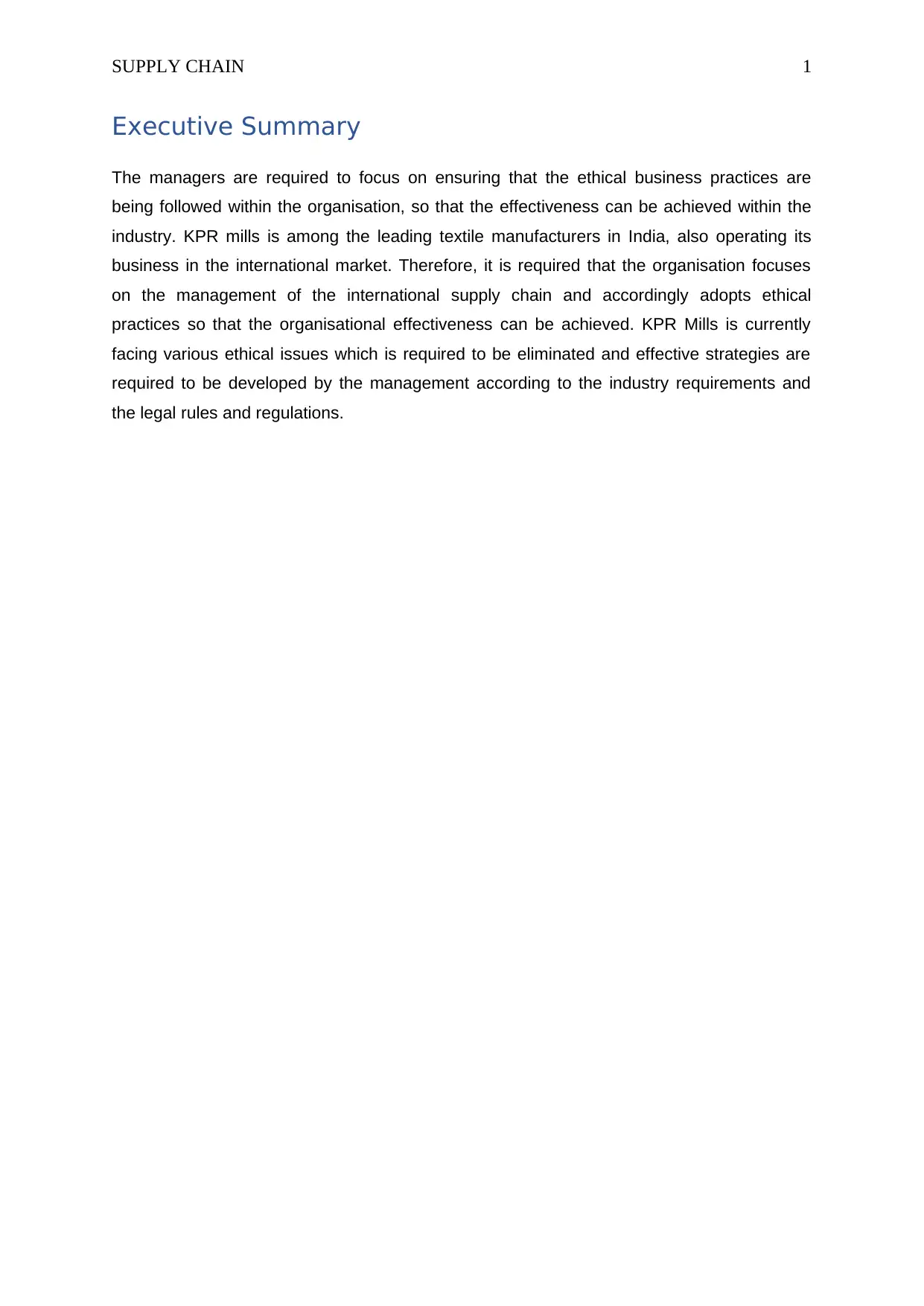
SUPPLY CHAIN 1
Executive Summary
The managers are required to focus on ensuring that the ethical business practices are
being followed within the organisation, so that the effectiveness can be achieved within the
industry. KPR mills is among the leading textile manufacturers in India, also operating its
business in the international market. Therefore, it is required that the organisation focuses
on the management of the international supply chain and accordingly adopts ethical
practices so that the organisational effectiveness can be achieved. KPR Mills is currently
facing various ethical issues which is required to be eliminated and effective strategies are
required to be developed by the management according to the industry requirements and
the legal rules and regulations.
Executive Summary
The managers are required to focus on ensuring that the ethical business practices are
being followed within the organisation, so that the effectiveness can be achieved within the
industry. KPR mills is among the leading textile manufacturers in India, also operating its
business in the international market. Therefore, it is required that the organisation focuses
on the management of the international supply chain and accordingly adopts ethical
practices so that the organisational effectiveness can be achieved. KPR Mills is currently
facing various ethical issues which is required to be eliminated and effective strategies are
required to be developed by the management according to the industry requirements and
the legal rules and regulations.
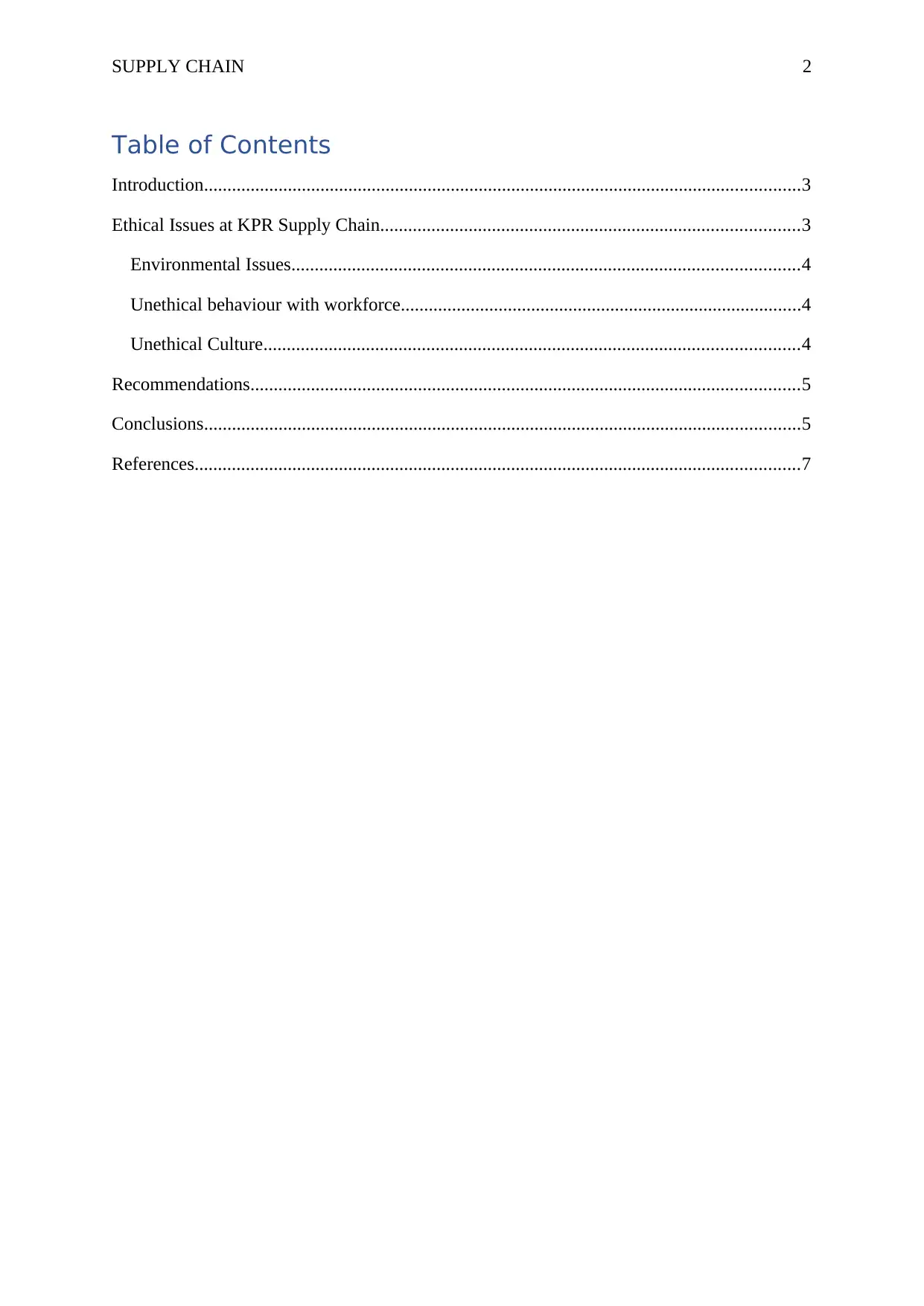
SUPPLY CHAIN 2
Table of Contents
Introduction................................................................................................................................3
Ethical Issues at KPR Supply Chain..........................................................................................3
Environmental Issues.............................................................................................................4
Unethical behaviour with workforce......................................................................................4
Unethical Culture...................................................................................................................4
Recommendations......................................................................................................................5
Conclusions................................................................................................................................5
References..................................................................................................................................7
Table of Contents
Introduction................................................................................................................................3
Ethical Issues at KPR Supply Chain..........................................................................................3
Environmental Issues.............................................................................................................4
Unethical behaviour with workforce......................................................................................4
Unethical Culture...................................................................................................................4
Recommendations......................................................................................................................5
Conclusions................................................................................................................................5
References..................................................................................................................................7
⊘ This is a preview!⊘
Do you want full access?
Subscribe today to unlock all pages.

Trusted by 1+ million students worldwide
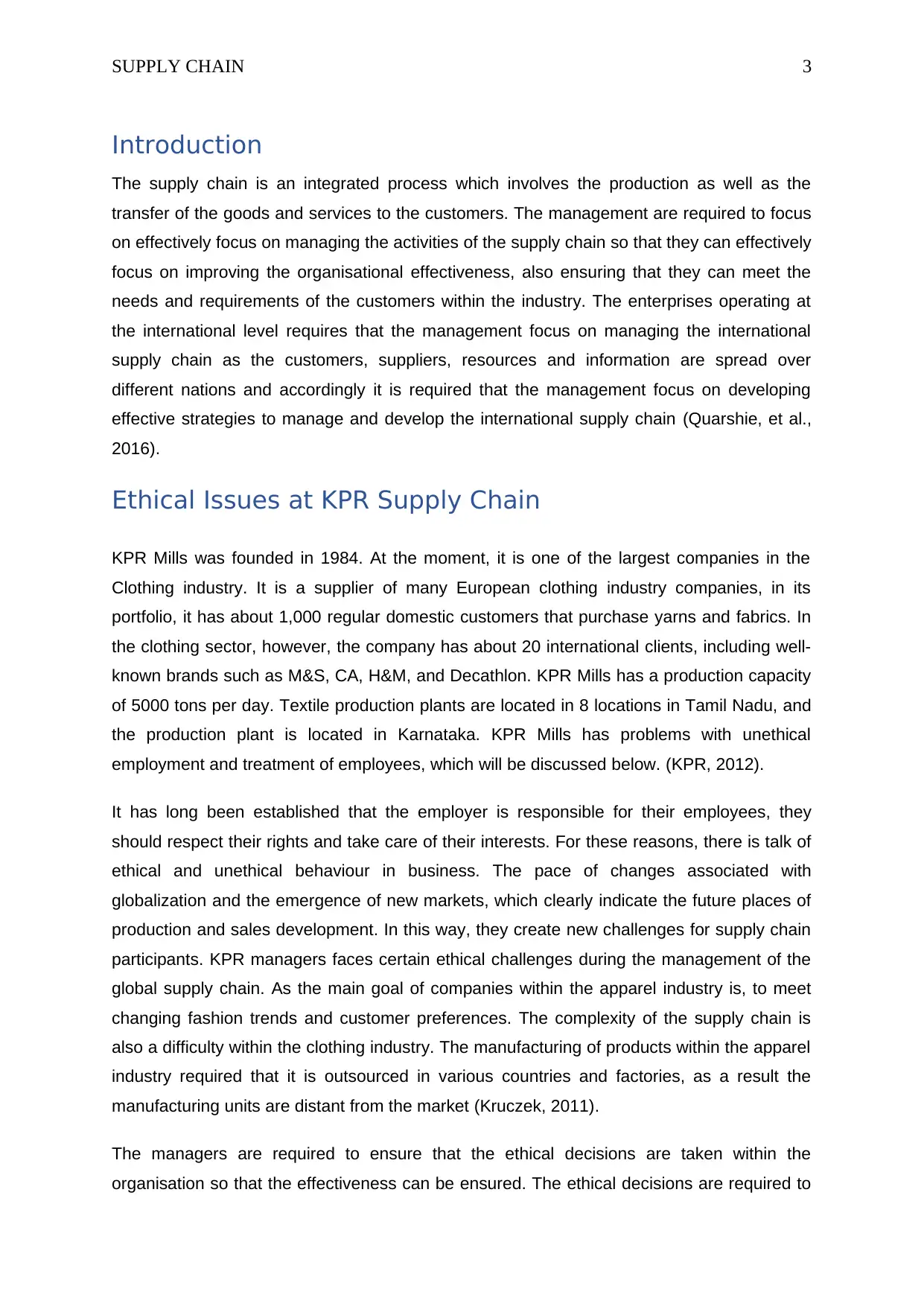
SUPPLY CHAIN 3
Introduction
The supply chain is an integrated process which involves the production as well as the
transfer of the goods and services to the customers. The management are required to focus
on effectively focus on managing the activities of the supply chain so that they can effectively
focus on improving the organisational effectiveness, also ensuring that they can meet the
needs and requirements of the customers within the industry. The enterprises operating at
the international level requires that the management focus on managing the international
supply chain as the customers, suppliers, resources and information are spread over
different nations and accordingly it is required that the management focus on developing
effective strategies to manage and develop the international supply chain (Quarshie, et al.,
2016).
Ethical Issues at KPR Supply Chain
KPR Mills was founded in 1984. At the moment, it is one of the largest companies in the
Clothing industry. It is a supplier of many European clothing industry companies, in its
portfolio, it has about 1,000 regular domestic customers that purchase yarns and fabrics. In
the clothing sector, however, the company has about 20 international clients, including well-
known brands such as M&S, CA, H&M, and Decathlon. KPR Mills has a production capacity
of 5000 tons per day. Textile production plants are located in 8 locations in Tamil Nadu, and
the production plant is located in Karnataka. KPR Mills has problems with unethical
employment and treatment of employees, which will be discussed below. (KPR, 2012).
It has long been established that the employer is responsible for their employees, they
should respect their rights and take care of their interests. For these reasons, there is talk of
ethical and unethical behaviour in business. The pace of changes associated with
globalization and the emergence of new markets, which clearly indicate the future places of
production and sales development. In this way, they create new challenges for supply chain
participants. KPR managers faces certain ethical challenges during the management of the
global supply chain. As the main goal of companies within the apparel industry is, to meet
changing fashion trends and customer preferences. The complexity of the supply chain is
also a difficulty within the clothing industry. The manufacturing of products within the apparel
industry required that it is outsourced in various countries and factories, as a result the
manufacturing units are distant from the market (Kruczek, 2011).
The managers are required to ensure that the ethical decisions are taken within the
organisation so that the effectiveness can be ensured. The ethical decisions are required to
Introduction
The supply chain is an integrated process which involves the production as well as the
transfer of the goods and services to the customers. The management are required to focus
on effectively focus on managing the activities of the supply chain so that they can effectively
focus on improving the organisational effectiveness, also ensuring that they can meet the
needs and requirements of the customers within the industry. The enterprises operating at
the international level requires that the management focus on managing the international
supply chain as the customers, suppliers, resources and information are spread over
different nations and accordingly it is required that the management focus on developing
effective strategies to manage and develop the international supply chain (Quarshie, et al.,
2016).
Ethical Issues at KPR Supply Chain
KPR Mills was founded in 1984. At the moment, it is one of the largest companies in the
Clothing industry. It is a supplier of many European clothing industry companies, in its
portfolio, it has about 1,000 regular domestic customers that purchase yarns and fabrics. In
the clothing sector, however, the company has about 20 international clients, including well-
known brands such as M&S, CA, H&M, and Decathlon. KPR Mills has a production capacity
of 5000 tons per day. Textile production plants are located in 8 locations in Tamil Nadu, and
the production plant is located in Karnataka. KPR Mills has problems with unethical
employment and treatment of employees, which will be discussed below. (KPR, 2012).
It has long been established that the employer is responsible for their employees, they
should respect their rights and take care of their interests. For these reasons, there is talk of
ethical and unethical behaviour in business. The pace of changes associated with
globalization and the emergence of new markets, which clearly indicate the future places of
production and sales development. In this way, they create new challenges for supply chain
participants. KPR managers faces certain ethical challenges during the management of the
global supply chain. As the main goal of companies within the apparel industry is, to meet
changing fashion trends and customer preferences. The complexity of the supply chain is
also a difficulty within the clothing industry. The manufacturing of products within the apparel
industry required that it is outsourced in various countries and factories, as a result the
manufacturing units are distant from the market (Kruczek, 2011).
The managers are required to ensure that the ethical decisions are taken within the
organisation so that the effectiveness can be ensured. The ethical decisions are required to
Paraphrase This Document
Need a fresh take? Get an instant paraphrase of this document with our AI Paraphraser
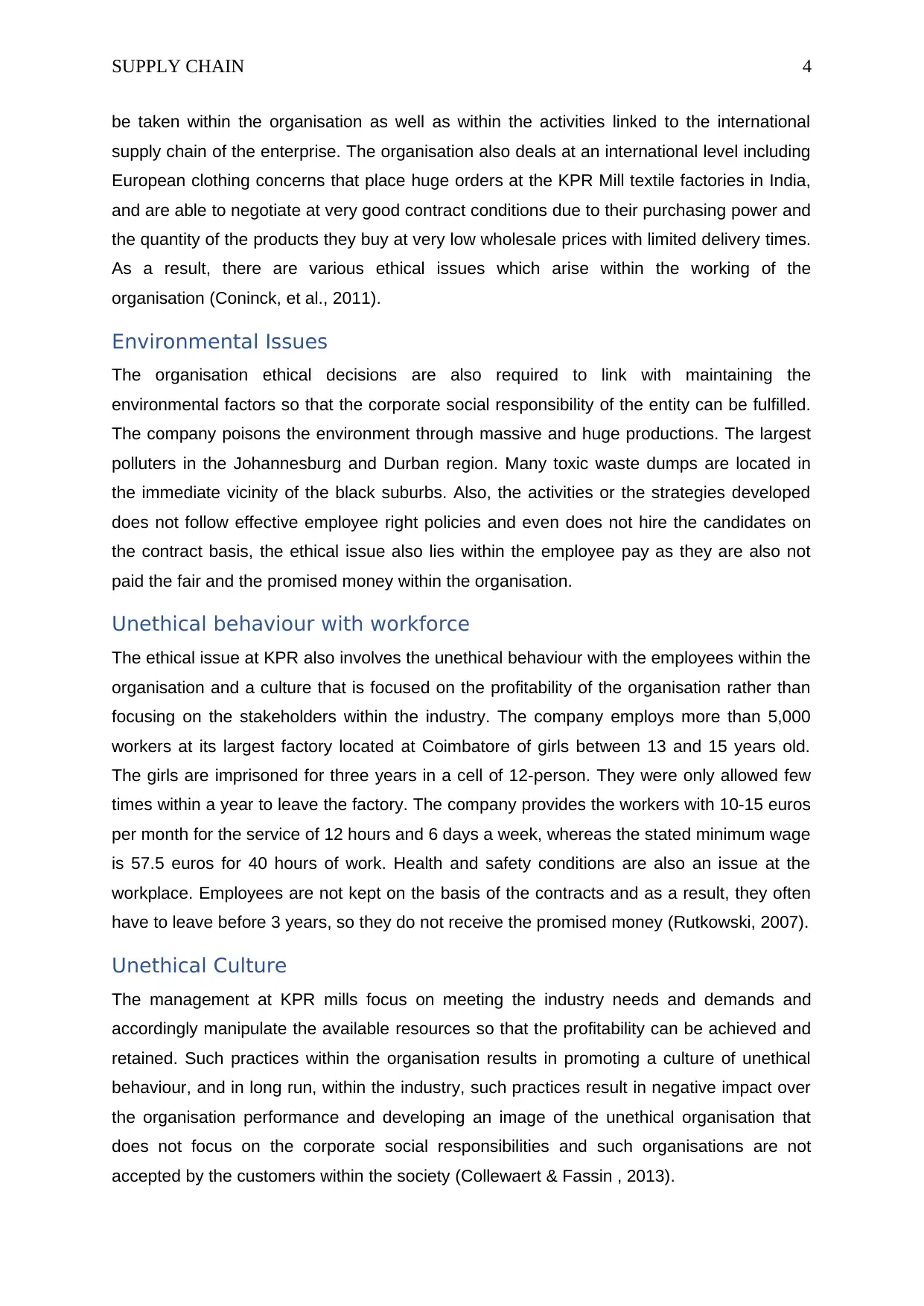
SUPPLY CHAIN 4
be taken within the organisation as well as within the activities linked to the international
supply chain of the enterprise. The organisation also deals at an international level including
European clothing concerns that place huge orders at the KPR Mill textile factories in India,
and are able to negotiate at very good contract conditions due to their purchasing power and
the quantity of the products they buy at very low wholesale prices with limited delivery times.
As a result, there are various ethical issues which arise within the working of the
organisation (Coninck, et al., 2011).
Environmental Issues
The organisation ethical decisions are also required to link with maintaining the
environmental factors so that the corporate social responsibility of the entity can be fulfilled.
The company poisons the environment through massive and huge productions. The largest
polluters in the Johannesburg and Durban region. Many toxic waste dumps are located in
the immediate vicinity of the black suburbs. Also, the activities or the strategies developed
does not follow effective employee right policies and even does not hire the candidates on
the contract basis, the ethical issue also lies within the employee pay as they are also not
paid the fair and the promised money within the organisation.
Unethical behaviour with workforce
The ethical issue at KPR also involves the unethical behaviour with the employees within the
organisation and a culture that is focused on the profitability of the organisation rather than
focusing on the stakeholders within the industry. The company employs more than 5,000
workers at its largest factory located at Coimbatore of girls between 13 and 15 years old.
The girls are imprisoned for three years in a cell of 12-person. They were only allowed few
times within a year to leave the factory. The company provides the workers with 10-15 euros
per month for the service of 12 hours and 6 days a week, whereas the stated minimum wage
is 57.5 euros for 40 hours of work. Health and safety conditions are also an issue at the
workplace. Employees are not kept on the basis of the contracts and as a result, they often
have to leave before 3 years, so they do not receive the promised money (Rutkowski, 2007).
Unethical Culture
The management at KPR mills focus on meeting the industry needs and demands and
accordingly manipulate the available resources so that the profitability can be achieved and
retained. Such practices within the organisation results in promoting a culture of unethical
behaviour, and in long run, within the industry, such practices result in negative impact over
the organisation performance and developing an image of the unethical organisation that
does not focus on the corporate social responsibilities and such organisations are not
accepted by the customers within the society (Collewaert & Fassin , 2013).
be taken within the organisation as well as within the activities linked to the international
supply chain of the enterprise. The organisation also deals at an international level including
European clothing concerns that place huge orders at the KPR Mill textile factories in India,
and are able to negotiate at very good contract conditions due to their purchasing power and
the quantity of the products they buy at very low wholesale prices with limited delivery times.
As a result, there are various ethical issues which arise within the working of the
organisation (Coninck, et al., 2011).
Environmental Issues
The organisation ethical decisions are also required to link with maintaining the
environmental factors so that the corporate social responsibility of the entity can be fulfilled.
The company poisons the environment through massive and huge productions. The largest
polluters in the Johannesburg and Durban region. Many toxic waste dumps are located in
the immediate vicinity of the black suburbs. Also, the activities or the strategies developed
does not follow effective employee right policies and even does not hire the candidates on
the contract basis, the ethical issue also lies within the employee pay as they are also not
paid the fair and the promised money within the organisation.
Unethical behaviour with workforce
The ethical issue at KPR also involves the unethical behaviour with the employees within the
organisation and a culture that is focused on the profitability of the organisation rather than
focusing on the stakeholders within the industry. The company employs more than 5,000
workers at its largest factory located at Coimbatore of girls between 13 and 15 years old.
The girls are imprisoned for three years in a cell of 12-person. They were only allowed few
times within a year to leave the factory. The company provides the workers with 10-15 euros
per month for the service of 12 hours and 6 days a week, whereas the stated minimum wage
is 57.5 euros for 40 hours of work. Health and safety conditions are also an issue at the
workplace. Employees are not kept on the basis of the contracts and as a result, they often
have to leave before 3 years, so they do not receive the promised money (Rutkowski, 2007).
Unethical Culture
The management at KPR mills focus on meeting the industry needs and demands and
accordingly manipulate the available resources so that the profitability can be achieved and
retained. Such practices within the organisation results in promoting a culture of unethical
behaviour, and in long run, within the industry, such practices result in negative impact over
the organisation performance and developing an image of the unethical organisation that
does not focus on the corporate social responsibilities and such organisations are not
accepted by the customers within the society (Collewaert & Fassin , 2013).
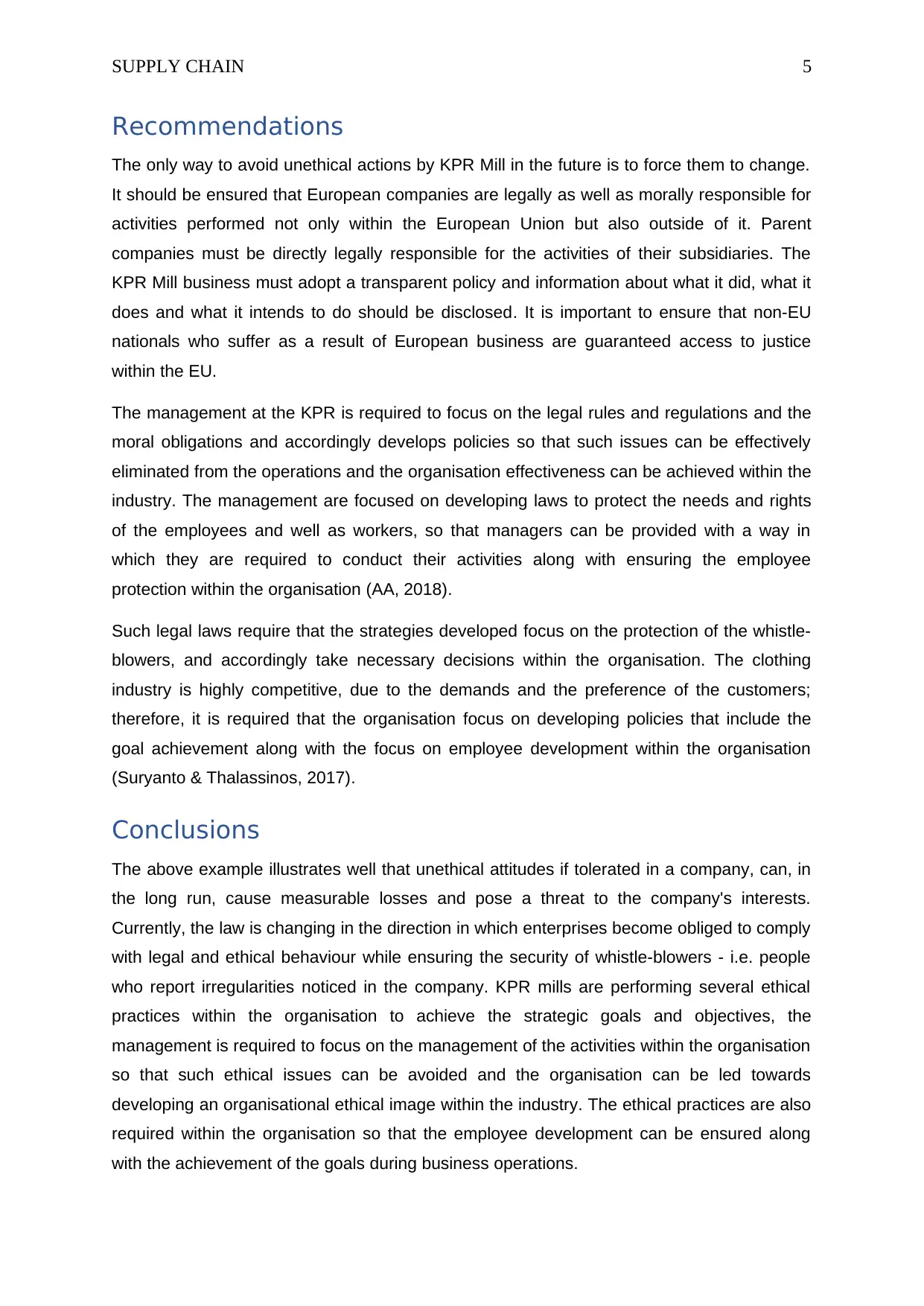
SUPPLY CHAIN 5
Recommendations
The only way to avoid unethical actions by KPR Mill in the future is to force them to change.
It should be ensured that European companies are legally as well as morally responsible for
activities performed not only within the European Union but also outside of it. Parent
companies must be directly legally responsible for the activities of their subsidiaries. The
KPR Mill business must adopt a transparent policy and information about what it did, what it
does and what it intends to do should be disclosed. It is important to ensure that non-EU
nationals who suffer as a result of European business are guaranteed access to justice
within the EU.
The management at the KPR is required to focus on the legal rules and regulations and the
moral obligations and accordingly develops policies so that such issues can be effectively
eliminated from the operations and the organisation effectiveness can be achieved within the
industry. The management are focused on developing laws to protect the needs and rights
of the employees and well as workers, so that managers can be provided with a way in
which they are required to conduct their activities along with ensuring the employee
protection within the organisation (AA, 2018).
Such legal laws require that the strategies developed focus on the protection of the whistle-
blowers, and accordingly take necessary decisions within the organisation. The clothing
industry is highly competitive, due to the demands and the preference of the customers;
therefore, it is required that the organisation focus on developing policies that include the
goal achievement along with the focus on employee development within the organisation
(Suryanto & Thalassinos, 2017).
Conclusions
The above example illustrates well that unethical attitudes if tolerated in a company, can, in
the long run, cause measurable losses and pose a threat to the company's interests.
Currently, the law is changing in the direction in which enterprises become obliged to comply
with legal and ethical behaviour while ensuring the security of whistle-blowers - i.e. people
who report irregularities noticed in the company. KPR mills are performing several ethical
practices within the organisation to achieve the strategic goals and objectives, the
management is required to focus on the management of the activities within the organisation
so that such ethical issues can be avoided and the organisation can be led towards
developing an organisational ethical image within the industry. The ethical practices are also
required within the organisation so that the employee development can be ensured along
with the achievement of the goals during business operations.
Recommendations
The only way to avoid unethical actions by KPR Mill in the future is to force them to change.
It should be ensured that European companies are legally as well as morally responsible for
activities performed not only within the European Union but also outside of it. Parent
companies must be directly legally responsible for the activities of their subsidiaries. The
KPR Mill business must adopt a transparent policy and information about what it did, what it
does and what it intends to do should be disclosed. It is important to ensure that non-EU
nationals who suffer as a result of European business are guaranteed access to justice
within the EU.
The management at the KPR is required to focus on the legal rules and regulations and the
moral obligations and accordingly develops policies so that such issues can be effectively
eliminated from the operations and the organisation effectiveness can be achieved within the
industry. The management are focused on developing laws to protect the needs and rights
of the employees and well as workers, so that managers can be provided with a way in
which they are required to conduct their activities along with ensuring the employee
protection within the organisation (AA, 2018).
Such legal laws require that the strategies developed focus on the protection of the whistle-
blowers, and accordingly take necessary decisions within the organisation. The clothing
industry is highly competitive, due to the demands and the preference of the customers;
therefore, it is required that the organisation focus on developing policies that include the
goal achievement along with the focus on employee development within the organisation
(Suryanto & Thalassinos, 2017).
Conclusions
The above example illustrates well that unethical attitudes if tolerated in a company, can, in
the long run, cause measurable losses and pose a threat to the company's interests.
Currently, the law is changing in the direction in which enterprises become obliged to comply
with legal and ethical behaviour while ensuring the security of whistle-blowers - i.e. people
who report irregularities noticed in the company. KPR mills are performing several ethical
practices within the organisation to achieve the strategic goals and objectives, the
management is required to focus on the management of the activities within the organisation
so that such ethical issues can be avoided and the organisation can be led towards
developing an organisational ethical image within the industry. The ethical practices are also
required within the organisation so that the employee development can be ensured along
with the achievement of the goals during business operations.
⊘ This is a preview!⊘
Do you want full access?
Subscribe today to unlock all pages.

Trusted by 1+ million students worldwide
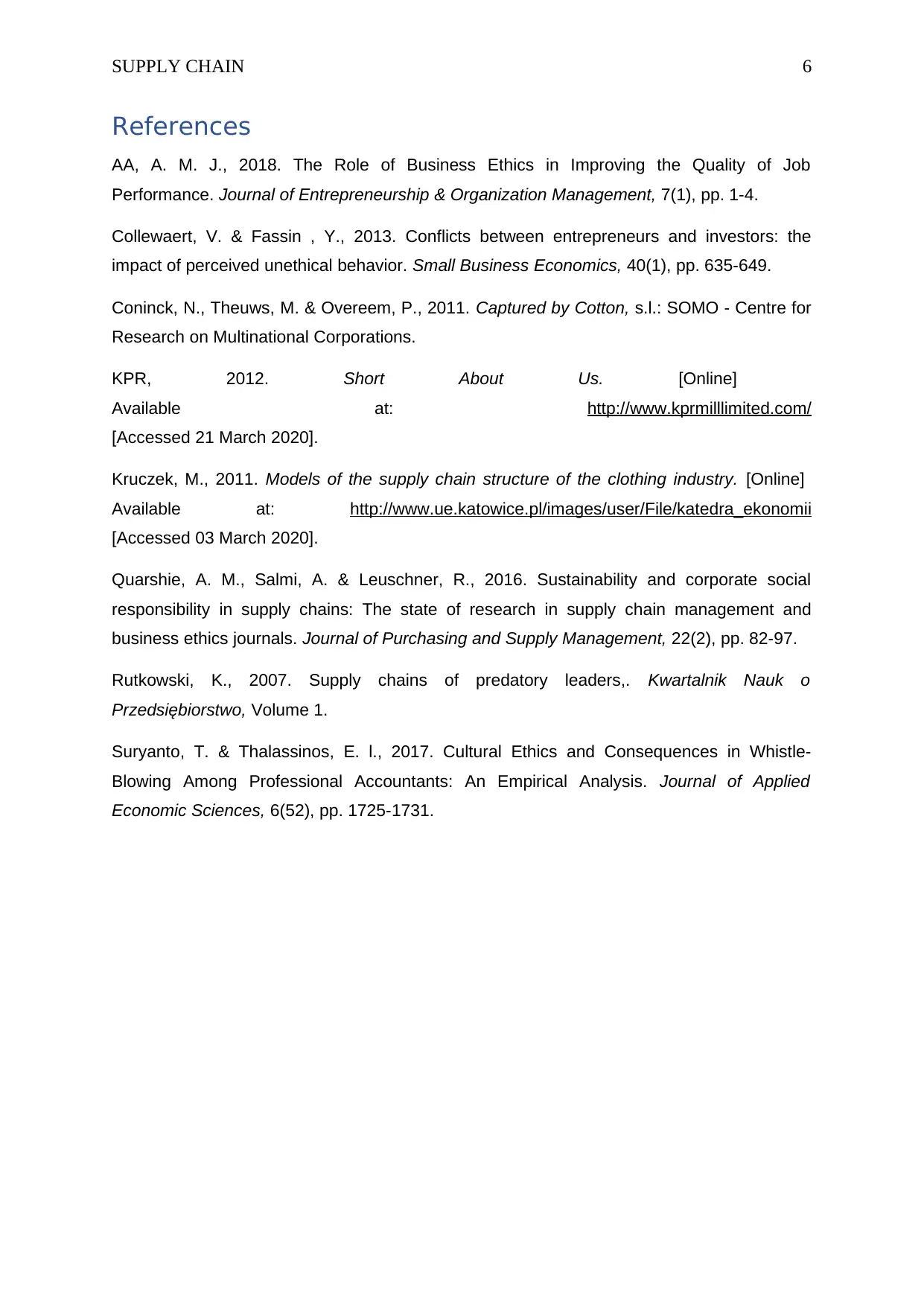
SUPPLY CHAIN 6
References
AA, A. M. J., 2018. The Role of Business Ethics in Improving the Quality of Job
Performance. Journal of Entrepreneurship & Organization Management, 7(1), pp. 1-4.
Collewaert, V. & Fassin , Y., 2013. Conflicts between entrepreneurs and investors: the
impact of perceived unethical behavior. Small Business Economics, 40(1), pp. 635-649.
Coninck, N., Theuws, M. & Overeem, P., 2011. Captured by Cotton, s.l.: SOMO - Centre for
Research on Multinational Corporations.
KPR, 2012. Short About Us. [Online]
Available at: http://www.kprmilllimited.com/
[Accessed 21 March 2020].
Kruczek, M., 2011. Models of the supply chain structure of the clothing industry. [Online]
Available at: http://www.ue.katowice.pl/images/user/File/katedra_ekonomii
[Accessed 03 March 2020].
Quarshie, A. M., Salmi, A. & Leuschner, R., 2016. Sustainability and corporate social
responsibility in supply chains: The state of research in supply chain management and
business ethics journals. Journal of Purchasing and Supply Management, 22(2), pp. 82-97.
Rutkowski, K., 2007. Supply chains of predatory leaders,. Kwartalnik Nauk o
Przedsiębiorstwo, Volume 1.
Suryanto, T. & Thalassinos, E. l., 2017. Cultural Ethics and Consequences in Whistle-
Blowing Among Professional Accountants: An Empirical Analysis. Journal of Applied
Economic Sciences, 6(52), pp. 1725-1731.
References
AA, A. M. J., 2018. The Role of Business Ethics in Improving the Quality of Job
Performance. Journal of Entrepreneurship & Organization Management, 7(1), pp. 1-4.
Collewaert, V. & Fassin , Y., 2013. Conflicts between entrepreneurs and investors: the
impact of perceived unethical behavior. Small Business Economics, 40(1), pp. 635-649.
Coninck, N., Theuws, M. & Overeem, P., 2011. Captured by Cotton, s.l.: SOMO - Centre for
Research on Multinational Corporations.
KPR, 2012. Short About Us. [Online]
Available at: http://www.kprmilllimited.com/
[Accessed 21 March 2020].
Kruczek, M., 2011. Models of the supply chain structure of the clothing industry. [Online]
Available at: http://www.ue.katowice.pl/images/user/File/katedra_ekonomii
[Accessed 03 March 2020].
Quarshie, A. M., Salmi, A. & Leuschner, R., 2016. Sustainability and corporate social
responsibility in supply chains: The state of research in supply chain management and
business ethics journals. Journal of Purchasing and Supply Management, 22(2), pp. 82-97.
Rutkowski, K., 2007. Supply chains of predatory leaders,. Kwartalnik Nauk o
Przedsiębiorstwo, Volume 1.
Suryanto, T. & Thalassinos, E. l., 2017. Cultural Ethics and Consequences in Whistle-
Blowing Among Professional Accountants: An Empirical Analysis. Journal of Applied
Economic Sciences, 6(52), pp. 1725-1731.
1 out of 7
Related Documents
Your All-in-One AI-Powered Toolkit for Academic Success.
+13062052269
info@desklib.com
Available 24*7 on WhatsApp / Email
![[object Object]](/_next/static/media/star-bottom.7253800d.svg)
Unlock your academic potential
Copyright © 2020–2026 A2Z Services. All Rights Reserved. Developed and managed by ZUCOL.





